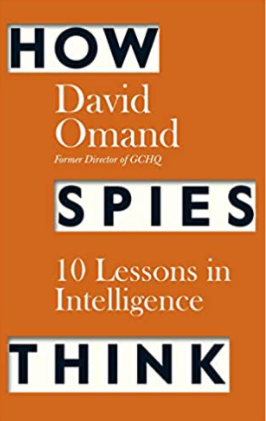
Deciphering the World of Espionage




David Omand, a rising Whitehall official, in 1982, with John Nott carrying top-secret folder intercepts from Government Communications Agency, GCHQ, met with then Prime Minister Margaret Thatcher, to reveal decrypted messaged, sent by the Argentine Navy, showing Leopoldo Galtieri’s junta was set to seize the Falkland Islands. The capital Port Stanley fell a few days later.
Ormand who became the director of GCHQ, reveals the methodology used by the British intelligence agencies to reach judgments, and establish the right level of confidence and act decisively.
Intelligence officers discern the truth. They often gather contradictory or incomplete information, and with it build the most accurate possible image of the world. With the stakes at their absolute highest, they must then decide what to do.
Omand, whose career took him into the secret spaces of Britain’s deep state, tells the Falklands story with purpose not just to advertise the skills of eavesdroppers. The warning had come too late for the UK government to reinforce the Falklands’ defences.
Based on earlier misleading intelligence about Argentine signals, Thatcher had failed to grasp Galtieri’s intelligence when it still might have been possible to avert a war.
Omand said, “ I have learned the hard way that intelligence is difficult to come by, and is always fragmentary and incomplete, and is sometimes wrong.”
Omand tells stories of modern business spookery- from the collection of the vast amounts of digital data and from the American National Security Agency to the more conventional gathering of secrets by officers and agents of the Secret Intelligence Service, or MI6. He makes it clear about both spies’ essential purpose is to forearm government as to the intentions of enemies and provide an important edge in the event of hostilities and about its limitations.
The explosion of information in the digital age with social media offering adversaries channels of information that intersect and overlap with those of ordinary citizens had made the task of agencies more complex and politically sensitive.
Success depends entirely on the proper analysis of information GCHQ provides.
According to Douglas Hurd, former foreign secretary, Intelligence is an area where Britain punches above its weight in the world. GCHQ has earned serious respect from NSA and partners of three other nations – Canada, Australia, and New Zealand –which comprise the so-called “Five Eyes” intelligence consortium.
Professor Omand reveals key briefing with Prime Ministers from Thatcher to Blair and conflicts from Falkland to Afghanistan and arms us with the tools to sort fact from fiction and shows us how to use real intelligence every day.
Omand documents other triumphs – the Treasure trove of secrets provided by Oleg Gordievsky, a KGB double agent, during the early 1980s which included invaluable information on Soviet spy networks and military dispositions.
Thatcher was prompted to tone down her iron lady rhetoric and build a relationship with the Soviet leader Mikhail Gorbachev. Encouraged by intelligence, US president, Ronald Regan, successfully pressed Gorbachev to agree to nuclear weapons reductions.
Omand also expressed failures and half failures the most notorious about Saddam Hussein’s supposed weapons of mass destruction in the run-up to the second Iraq war.
The first mistake was not to look at the world through Saddam’s eyes revealing how he believed his domestic authority in Iraq rested on a pretense that he still had WMD.
The intelligence from the Iraqi scientist codenamed Curveball was often questioned but never sufficiently strongly to overturn the prevailing assumption that Saddam continued to defy the UN.
It is through intelligence the west learned that Moscow’s fears of a “first strike” by the US and Nato and its affiliated risk it might seek to pre-empt it, were dangerously real.
How Spies Think: 10 Lessons in Intelligence by David Omand, Penguin £20, 352 pages.
